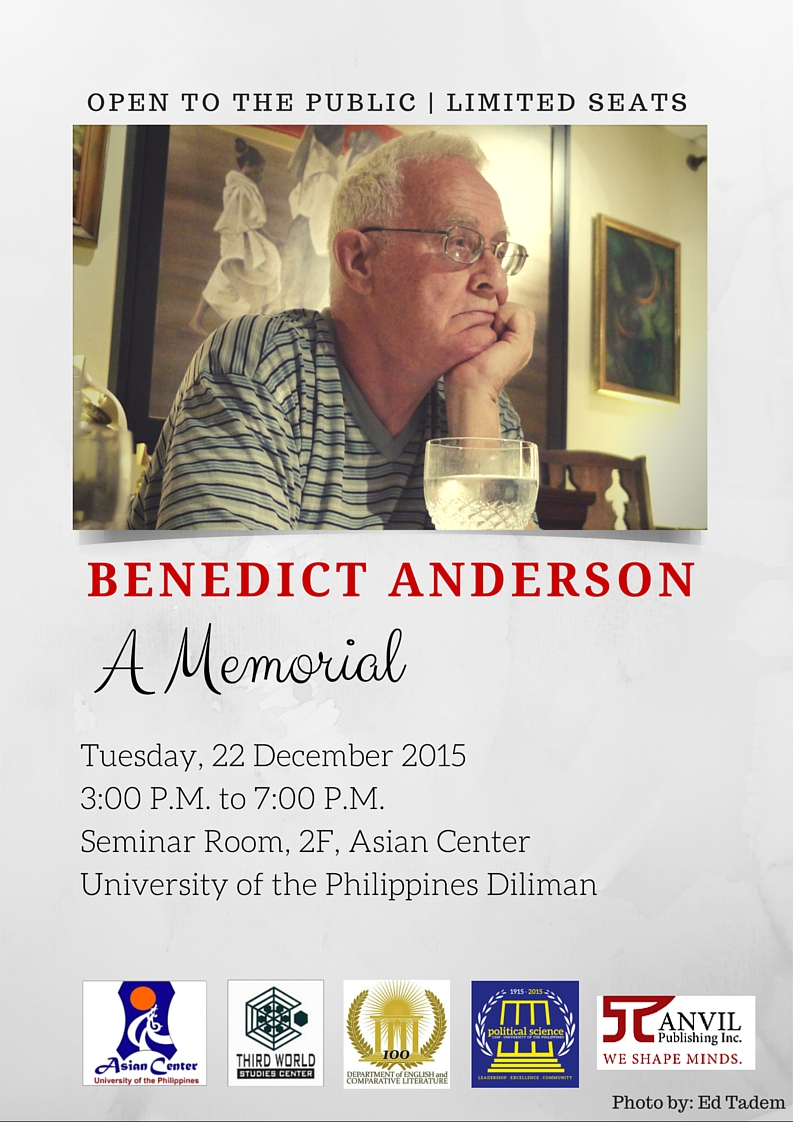 The Asian Center, University of the Philippines Diliman hosted a memorial for Professor Benedict Anderson on Tuesday, 22 December 2015, 3:00 p.m. to 7:00 p.m. at the Seminar Room, 2F, Hall of Wisdom, Asian Center, University of the Philippines Diliman.
The Asian Center, University of the Philippines Diliman hosted a memorial for Professor Benedict Anderson on Tuesday, 22 December 2015, 3:00 p.m. to 7:00 p.m. at the Seminar Room, 2F, Hall of Wisdom, Asian Center, University of the Philippines Diliman.
Benedict Richard O’Gorman Anderson, who was Professor Emeritus of International Studies, Government and Asian Studies at Cornell University, passed away on 13 December 2015 in Indonesia. He was 79.
Professor Anderson is best-known for his book, Imagined Communities: Reflections on the Origin and Spread of Nationalism, which was first published in 1983 but has since undergone countless editions and been translated into several languages. One of the most influential works on nationalism, the book is a path-breaking and highly innovative work that has supplied one of the most popular and oft-quoted concepts, "imagined community,” in the academe and beyond.
Sharing their memories of one of the luminaries of Southeast Asian Studies were friends and former students, including:
- Vince Boudreau, Dean of the Colin Powell School for Civic and Global Leadership, City College of New York
- Ramon Guillermo of the UP Department of Filipino
- Karina Bolasco of Anvil Publishing, publisher of Philippine editions of several of Ben Anderson’s books
- Joel Rocamora, a former student in Cornell and current secretary of the National Anti-Poverty Commission, Philippines
- Lisandro Claudio, a post-doctoral fellow at the Center for Southeast Asian Studies, Kyoto University
- Vicente Rafael, Professor, University of Washington and Cornell University alumni
- Eduardo C. Tadem, host of the event and Professor at the UP Asian Center
- Paul Hutchcroft, Australian Embassy in the Philippines
- Tina Cuyugan, writer, editor of Forbidden Fruit: Filipino Women Write the Erotic
The remarks of three of Professor Anderson’s former students in Cornell University, Caroline Hau, Patricio Abinales, and Filomeno Aguilar, Jr, were read on their behalf. Footage of his wake in Indonesia, including brief comments by his brother, Perry Anderson, was also shown.
Watch: The UP Third World Studies Center Uploaded a Video of the Memorial Service
Along with Thailand and Indonesia, the Philippines figured prominently in many of Professor Anderson’s writings, such as the article, “Cacique Democracy in the Philippines: Origins and Dreams” (1988). He had great admiration for José Rizal, whom he affectionately called Lolo José. His book, The Spectre of Comparisons: Nationalism, Southeast Asia and the World (1998) includes chapters on the Philippines’ national hero and his two novels, Noli Me Tangere and El Filibusterismo. Indeed, the title of the book, "Spectres of Comparison" is a phrase taken directly from the Noli (“el demonio de las comparaciones").
Under Three Flags: Anarchism and the Anticolonial Imagination (2005), among other things, positions Rizal in a global, nineteenth-century context; and his short book, Why Counting Counts: A Study of Forms of Consciousness and Problems in Language in Noli Me Tangere and El Filibusterismo (2008) presents an original and unorthodox reading of both novels. His last book on the Philippines was Ang Diablo sa Filipinas ayon sa nasasabi sa casulatan luma sa Kastila (The Devil in the Philippines According to Ancient Spanish Writings), a translation of Isabelo de los Reyes’ work; launched at the UP Asian Center in November 2014, it was translated and annotated with Dr. Ramon Guillermo and Carlos Sardiña Galache.
Read: Filomeno Aguilar, Jr. reflects on Benedict Anderson’s contributions to Philippine Studies.
The enduring connection of Professor Anderson extends beyond book publishing. As noted, several of his former students in Cornell University were Filipinos, as are many of his friends and colleagues, whom he met or worked with throughout his visits and travels to the Philippines, trips that included several lectures. Two of these were held at the Asian Center, University of the Philippines Diliman. First, in “A Conversation with Benedict Anderson” in March 2013, he was interviewed by a panel of four scholars from the university. A year later, he returned to talk about his book, The Age of Globalization: Anarchism and the Anticolonial Imagination, the 2013 revised and updated version of “Under Three Flags.” He was also a member of the editorial advisory board of Asian Studies: Journal of Critical Perspectives on Asia, the journal published by the UP Asian Center since 1963.
The memorial for Benedict Anderson is organized by the UP Asian Center, The Third World Studies Center, the UP Department of Political Science, the UP Department of English and Comparative Literature, and Anvil Publishing.
The Asian Center offers M.A. degrees in Asian Studies with four fields of specialization: Northeast Asia, Southeast Asia, South Asia, and West Asia. The Center also has an M.A. program in Philippine Studies that allows students to major in Philippine society and culture, Philippine foreign relations, or Philippine development studies. The Center offers a Ph.D. program in Philippine Studies in conjunction with the College of Arts and Letters and the College of Social Sciences and Philosophy. For an overview of these graduate programs, click here. The Asian Center also publishes Asian Studies: Journal of Critical Perspectives on Asia, the latest issue of which can be downloaded at the journal's website. View recent and upcoming Lectures & Conferences and read other News & Announcements. Join our mailing list to receive invitations to lectures, conferences, etc.

